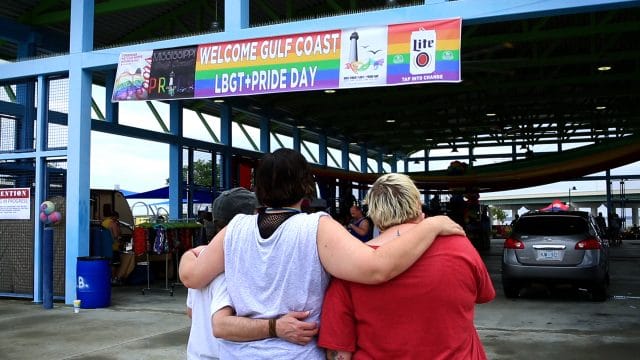
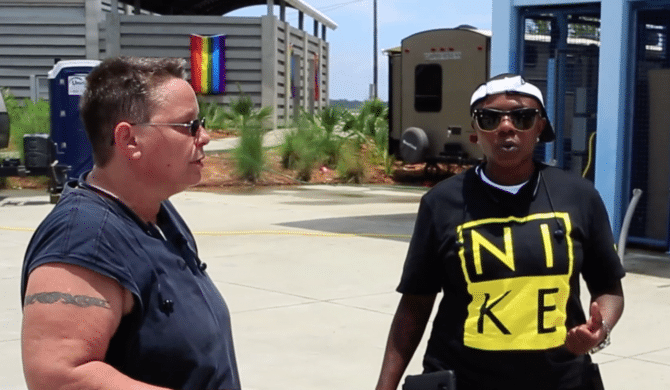
“I was looking for Jesus porn.”
“Is that a thing?” I ask, somewhat dumbstruck.
Malcolm Ingram, the acclaimed director of Continental, Small Town Gay Bar and Out to Win explains that he really wanted to upset someone. So he took to Google to find the most offensive thing he could think of: Jesus doing porn.
“Isn’t everything a thing?” Ingram asks me. “You can Google anything, but you can’t Google that?”
He has a point. His sense of humor also betrays his artistic sensibility. As a filmmaker, Ingram gravitates to all things fringe, reveling in the unique beauty of it all. He doesn’t let fear stop him from exploring something new, taboo subjects or peculiar interests. After two less-than-successful narrative features (produced by his longtime friend Kevin Smith, who appeared with him on the cover of A Bear’s Life magazine), Ingram found his true calling as a documentarian. With the 2006 premiere of Small Town Gay Bar at the Sundance Film Festival, Ingram has earned a reputation as a sincere, playful director.
“Am I being blasphemous?” Ingram giggles.
Ingram’s forthcoming film Southern Pride is about the first ever pride celebrations in two small Mississippi towns. The film comes to VOD June 11.
I wrote an article for CNN after Orlando, after the shootings [at Pulse nightclub]. CNN, because of Small Town Gay Bar, had contacted me and wanted me to write this thing on safe space. Lynn had been in contact long before, but we hadn’t had contact in a long time. But it got me thinking about revisiting the area. I reached out to her, and we started this dialogue. I thought, maybe I’d do a reality show and revisit that world.
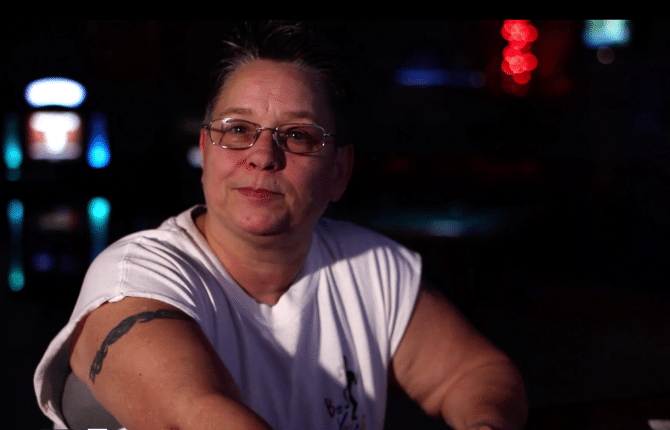 Lynn Koval
Lynn Koval
Then, literally the night Trump won the election, I woke up and thought f*ck it. I need to make this documentary. I need to make it now. We started shooting the day of the inauguration, and in the process, independently, Lynn decided she was going to have a pride. The fact that she wanted to have a pride made the narrative much easier to create.
She was gung-ho. Lynn is a remarkable human. We need more people like her. And she went warts & all. I’m sure she regretted it many times.
[Laughter]
She’s not a stupid person. It’s incredibly complicated to try and get your community together, to put together a pride event for the first time. She had so much going against her. And she had the courage to let me film it. She never had any regret. When she finally saw the movie, of course, she had issues with it but she never asked me to take anything out. She stands by it. She’s a remarkable, incredibly complicated woman.
It is very complicated. Lynn Koval isn’t an outward racist, but it’s very complicated in the south. It’s very complicated in America right now. Everything is Us vs. Them stuff. But we’re all human. And Lynn’s heart is in the right place, and she’s a remarkable advocate for her community. She’s built her life around it.
She’s kickass.
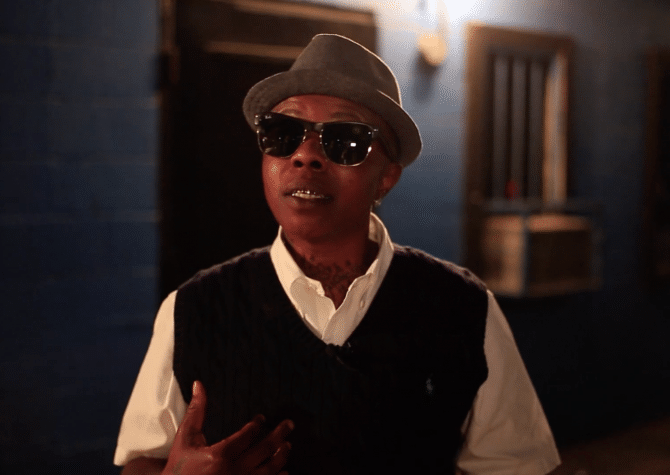 Shawn Perryon
Shawn Perryon
She’s been through a lot of sh*t. She’s been in jail. She’s somebody who’s seen sh*t, but has found peace. She’s found her way. She’s going to make a difference, and she’s going to do it her way. We actually—the funny thing is—I was in such a rush to get down to Biloxi, that when I got there I was like what else is going on? [Shawn] didn’t even have a website for her place. I found her bar on a Facebook page. I didn’t even know if it was going to be open, so we took the drive up there and met Shawn. At first, I was intimidated. She’s a very serious person. I told her who I was and gave her a copy of Small Town Gay Bar and told her I wanted to include her bar in the film. Eventually, she came back and said she’d already had this idea for [black pride]. It was like, total happenstance.
I always thought the degenerates went to Pride, not run it.
[Laughter]
The thing about the south is that they’re going talk behind your back. They’re non-confrontational. A lot of people had issues with it, but they’re not going to form a protest or stop it from happening. Both prides are having their third year in the next few weeks. I’m going to go to Shawn’s. Lynn isn’t that much involved with her pride. Shawn’s still the driving voice in hers.
The thing about it is it’s not just the south. All over America and the world that attitude is permissive. There’s nothing I saw. You heard things. Biloxi is a town that doesn’t like Black Spring Break [a beach festival by African-American college students on spring break]. At all. But it’s one of those things. What town likes to be overrun by kids? But the racial element certainly comes into it. It’s a fascinating thing to watch. Imagine the complications of a bunch of partying university kids in your town, and then add the concept of racial issues. The general town doesn’t embrace these events.
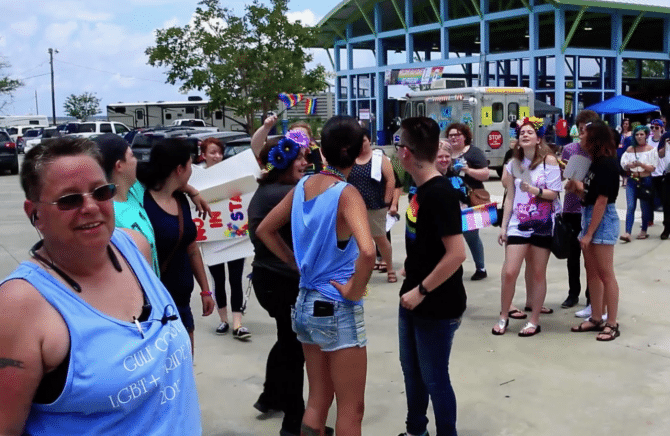 Biloxi Pride
Biloxi Pride
It wasn’t really the story I was telling. It was interesting, but it would have been really tangential. When you have a group of people coming together being noisy, people automatically are like I don’t like it. Then if there’s something that differentiates them, they’re going to emphasize that. It’s the same as Why do they need to have Pride? It’s what we’re seeing in Boston right now with “straight pride.”
Pride is really important because people forget: Pride is about the people who need it. In our film, what’s really wonderful is that the young people there have never been able to get together before and get to be gay. They got to all get-together and be who they are. And Lynn created a safe space for the first time in their town. For the first time in their town, these people got to be who they were. They got to hold hands. They got to kiss. They got to have a moment with protesters. They got to wave their flags in their own town. The one thing I kept hearing over and over was, “I never thought I’d see the day.” And the younger people were just elated. They know it’s happening [in big cities elsewhere]. But to have pride in their own town, it validates them. That’s so important.
If you’re a gay person, you’ve been through a lot. If you’re gay you’ve had to go through AIDS. You’ve been through being rejected by family. You’ve had to come out. You’ve had to do so many things that a heterosexual hasn’t. By the time you finally get to your 20s or 30s, it’s such a gamut to run. But the job’s not done. It’s very interesting in the film that the people who do the heavy lifting in the film are lesbians.
That’s just who showed up to do it. The lesbians took over and made the event happen. Lynn is the strongest force in Mississippi’s queer community. That bar is an anchor in that town.
As long as Lynn Koval is living–that bar and Lynn are one. That bar is amazing. That was a privilege; it’s my favorite bar I’ve ever been to. It’s open 24 hours a day. It never closes. At holidays, Lynn will have a potluck. She makes a turkey and people come in. It’s a community center. People have such misconceptions about the south. There are small-minded assholes everywhere. There are advocates everywhere. Lynn has taken on the responsibility of being an advocate, and she takes it very seriously. She cares about people. Shawn’s the same way.
That’s exactly what’s going on.
Representation is everything. Lynn’s been doing this now for almost 30 years. When she first opened up, the cops would bust them. People would run in and bust sh*t up. But she persevered, and now she’s part of the community. I don’t think it would be a safe place for gay people without Lynn. The same is true [of Shawn] and Hattiesburg. Neither Shawn nor Lynn is motivated by money. It’s a calling.
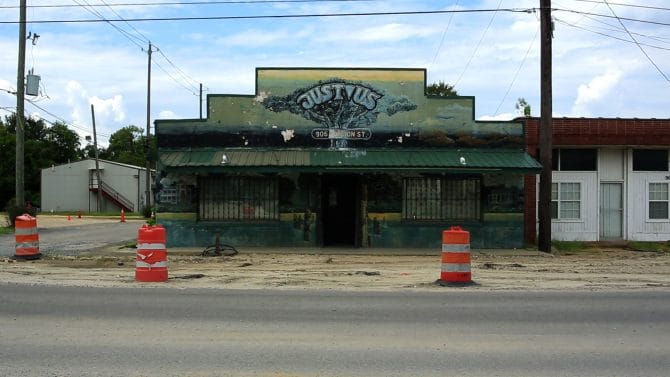 Just Us
Just Us
I like misfits. I like fringe, misfit communities. I didn’t come out until my ’30s. I was a very confused kid. So my documentaries are very much letters to my 16-year-old self. If I had seen them, the world would have made more sense. These movies are all made through private financing.
I wouldn’t say it’s a moral obligation. It’s what interests me. I love the gay community. I love being gay, and I have a lot of empathy for the struggles of everybody. I would like to make it easier for people. I started off making narrative films, and I was fucking shitty at it.
[Laughter]
I was really bad.
I made narrative films when I was too young. I was very lucky. But I realized very quickly—and Kevin [Smith] helped me learn this—if you’re passionate about something, it’ll get done. The last narrative I made, I didn’t give a fuck about it. And it’s a bummer because the cast was great. I worked with Elizabeth Berkley!
[Laugher]
It’s something I feel very passionate about. I feel very passionate about our community. I feel very passionate about the people in our community. And if I can help, that’s what I want to do. I dunno. It’s what keeps me interested. I’ve never wanted to be a celebrity. I’ve never wanted to be rich, thank God. Ultimately, I just want to make things that matter to me. I want to have a voice, and I love the concept of storytelling, of sitting by the fire, of our history being told. The privilege of talking to people who, you wouldn’t normally hear their voice, and then getting to carry it. It’s my responsibility to tell that story, it’s a privilege and very intimate.
That’s what keeps me going.
Southern Pride comes to Amazon, iTunes, VUDU and other services June 11.







